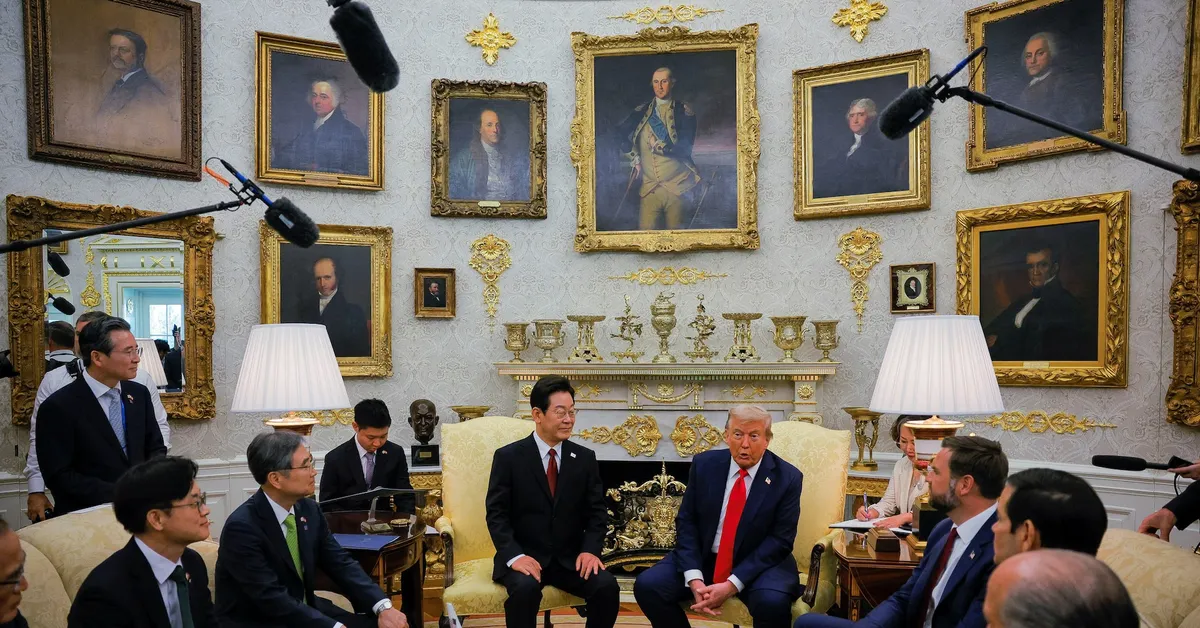
On August 25, 2023, U.S. President Donald Trump publicly stated his interest in meeting with North Korean leader Kim Jong Un this year. During a press briefing in the Oval Office, where he welcomed South Korea's newly inaugurated president, Lee Jae Myung, Trump expressed optimism about future diplomatic engagements. “I look forward to meeting with Kim Jong Un in the appropriate future,” he told reporters, indicating a willingness to rekindle dialogue.
The meeting between Trump and Lee was marked by underlying tensions. Prior to their discussion, Trump had made ambiguous comments on social media regarding a 'Purge or Revolution' in South Korea, which he later retracted, attributing it to a misunderstanding. Despite a recent trade agreement reached in July that helped protect South Korean exports from more stringent U.S. tariffs, the two nations continue to negotiate complex issues, including nuclear energy, military spending, and the specifics of a trade deal that promises approximately $350 billion in South Korean investments in the United States.
After their discussions, President Lee was scheduled to attend a business forum that included senior U.S. officials and executives from prominent U.S. firms such as Carlyle Group, Nvidia, Boeing, GE Aerospace, Honeywell, and General Motors.
North Korea has yet to respond to Trump's invitation for dialogue. Since Trump’s inauguration in January, Kim Jong Un has disregarded multiple attempts by Trump to reinitiate the direct diplomacy that characterized their previous interactions between 2017 and 2021, which ultimately did not yield an agreement to halt North Korea’s nuclear program. Recently, North Korea has ramped up its rhetoric, with Kim pledging to enhance his country's nuclear capabilities while condemning the joint military exercises conducted by the U.S. and South Korea. Over the weekend, Kim oversaw the test firing of new air defense systems as tensions in the region continue to escalate.
During the meeting, President Lee adopted a diplomatic approach that avoided the confrontational style seen in previous meetings between Trump and other foreign leaders, such as Ukrainian President Volodymyr Zelenskiy and South African President Cyril Ramaphosa. Lee engaged Trump by discussing golf and complimenting the president's taste in decor and peace initiatives. He also shared that he had read Trump's 1987 memoir, Trump: The Art of the Deal, as part of his preparation for the meeting.
Lee encouraged Trump to pursue peace on the Korean Peninsula, stating, “I hope you can bring peace to the Korean Peninsula, the only divided nation in the world.” He humorously suggested the possibility of building a Trump World real-estate complex in North Korea, indicating a desire for enhanced economic ties and cooperation.
The U.S.-South Korea relationship is heavily influenced by economic and security dynamics, with the U.S. providing military support in the region. Trump has criticized South Korea as a “money machine” benefiting from American military protection. He is currently pressing South Korea on the trade agreement already established and addressing issues related to their military alliance.
Moreover, Trump indicated he would bring up intelligence regarding ongoing investigations in South Korea that he claims target churches and military facilities. Recently, South Korean police raided the Sarang Jeil Church, led by evangelical preacher Jun Kwang-hoon, as part of an investigation into activists supporting former President Yoon Suk Yeol. The police action has been controversial, especially among South Korea's far-right movement, which views Yoon as a victim of alleged communist persecution.
In discussions about defense spending, Trump is likely to urge Lee to commit to increased funding for the upkeep of the 28,500 American troops stationed in South Korea. When asked about the potential reduction of U.S. troop numbers, Trump stated, “I don’t want to say that now,” but suggested that South Korea should consider giving the U.S. ownership of land where American military facilities, like Camp Humphreys, are located.
Before traveling to Washington, Lee hinted that accepting U.S. demands regarding military flexibility would be challenging for Seoul. His administration aims for a balanced approach, fostering cooperation with the U.S. while avoiding tensions with China, South Korea's largest trading partner. Even as he visited Washington, Lee dispatched a special delegation to Beijing, emphasizing the importance of normalized ties with China.
As the situation evolves, Trump is expected to attend the Asia-Pacific Economic Cooperation summit in South Korea from October 30 to November 1, where further discussions on trade and security are anticipated.